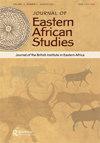公共信件与肯尼亚的政治文化,约1960-75年
IF 0.6
3区 社会学
Q2 AREA STUDIES
引用次数: 1
摘要
摘要尽管肯尼亚独立时只有少数非洲人口识字,但在非殖民化期间,写信是基层政治参与者和国家领导人之间的一种重要接触形式。本文旨在询问为什么个人和作家合作团体向他们的领导人发送大量信件,他们写了什么,以及他们对信件效果的期望。它认为,这些信件构成了肯尼亚非殖民化的公共领域。肯尼亚人在信中辩论了发展政策,批评了新执政精英的行为,并阐述了他们对独立统治的希望和恐惧。此外,写信也为广大作者群体提供了机会,他们往往包括那些没有足够文化能力以自己的名义写作的人,就其他有争议的问题达成共识。同样重要的是,国家官员对这些信件的回应——起初是建设性的,后来是可疑的——表明了非殖民化期间治理性质的持续性和变化。随着后殖民时期的发展,写信变得不那么有效,也更加不合时宜,因为后殖民国家开始依赖其他政治参与仪式。本文章由计算机程序翻译,如有差异,请以英文原文为准。
Public letters and the culture of politics in Kenya, c.1960-75
ABSTRACT Despite only a minority of Kenya’s African population being literate at the time of independence, letter-writing constituted a significant form of engagement between grassroots political participants and national leaders during decolonisation. This paper sets out to ask why individuals and collaborative groups of writers sent large quantities of letters to their leaders, what they wrote about, and their expectations of the effect of their correspondence. It argues that these letters constituted a public sphere in decolonising Kenya. Through their letters, Kenyans debated development policy, critiqued the actions of the new governing elite, and set out their hopes and fears for independent rule. Furthermore, letter-writing also provided the opportunity for large groups of authors, often including those without sufficient literacy to write in their own name, to reach consensus among themselves on otherwise contentious issues. Just as importantly, the responses – at first constructive and later suspicious - of state officials to these letters illustrates the continuities and changes in the nature of governance during decolonisation. Letter-writing became less effective and more anachronistic as the post-colonial period progressed as the post-colonial state became reliant upon other rituals of political participation.
求助全文
通过发布文献求助,成功后即可免费获取论文全文。
去求助
来源期刊

Journal of Eastern African Studies
AREA STUDIES-
CiteScore
3.30
自引率
7.10%
发文量
12
期刊介绍:
Journal of Eastern African Studies is an international publication of the British Institute in Eastern Africa, published four times each year. It aims to promote fresh scholarly enquiry on the region from within the humanities and the social sciences, and to encourage work that communicates across disciplinary boundaries. It seeks to foster inter-disciplinary analysis, strong comparative perspectives, and research employing the most significant theoretical or methodological approaches for the region.
 求助内容:
求助内容: 应助结果提醒方式:
应助结果提醒方式:


